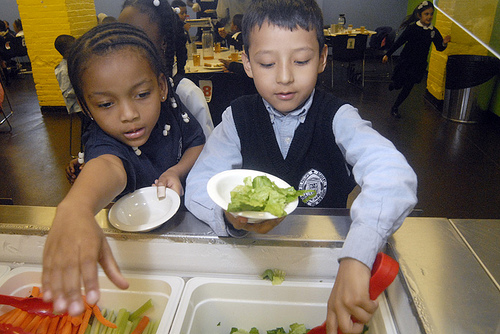 Eight billion dollars. It’s what we currently spend in the National School Lunch program. It’s not currently part of the health care legislation being debated, but some, including Ann Cooper and Beth Collins, co-founders of the Lunch Box Project, think it should be.
Eight billion dollars. It’s what we currently spend in the National School Lunch program. It’s not currently part of the health care legislation being debated, but some, including Ann Cooper and Beth Collins, co-founders of the Lunch Box Project, think it should be.
The Lunch Box Project is tool for schools and their various stakeholders to bring healthy food to their cafeterias. Cooper and Collins claim that when fully developed, the toolkit will include a multi-faceted approach that can help any school transition from processed food to a “whole foods environment where food is procured regionally and prepared from scratch for the student population.”
Ambitious? You bet. Cooper and Collins, in fact, think we should raise the sum of the National School Lunch Program by about five billion dollars to thirteen billion total annually, citing the rising problems in childhood obesity, failing schools, diabetes and other health problems. The stats are appalling. Children born since 2000 face a shorter life expectancy than the generation before them, which is the first time in history in the U.S. that this trend would exist. 1 in 3 Caucasian children, and 2 of every 3 African American and Hispanic children will contract diabetes during their lives. As a nation, we spend more on health care than any other country, by a factor of almost 3 to 1. $147 Billion of that, according to Time Magazine, is spent on diet-related illness. Most, if not all of this, is preventable.
How much would that extra $5 billion in spending on school lunches help? The magnitude is hard to fathom. How many schoolkids take medication for ADD when the real answer might be that they need less processed food and more exercise? How much do those medications cost us in tax dollars? Things that kids do at school tend to make their way into the home and into the habits of the family, too, meaning that eating fresh and local, especially if the child can be a part of an innovative program that brings gardening into their curriculum, could revolutionize half of America’s eating habits.
Beyond the obvious, what does this mean to the rest of the economy? Low wage workers in school cafeterias, long purged of any culinary abilities by the processed foods that only require reheating, will once again enjoy their jobs as they begin to discover the joy of creating actual food. Local farms will find a bonanza market for their crops and begin to plant a diversity in order to meet demands of their local schools. Parents may meet them at a farmer’s market and tell them that their son had never eaten green beans before but is now asking for them at home. New, green jobs will result, and old, gray jobs will disappear.
Scott Cooney is the author of Build a Green Small Business: Profitable Ways to Become an Ecopreneur (McGraw-Hill)



A very Nice and Inspiring Article.A true study about our need of Food for School Children and the good effects it will have on students, families, society and the economy..Thanks
A very Nice and Inspiring Article.A true study about our need of Food for School Children and the good effects it will have on students, families, society and the economy..Thanks